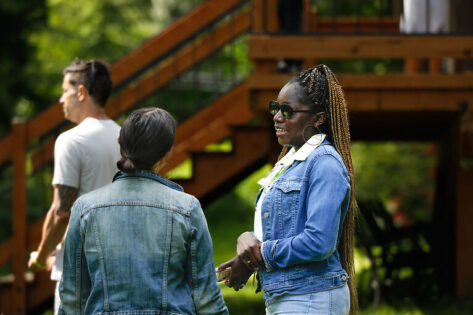
November 21, 2022 — This week, we sat down with our friend and colleague, Tracey Boulandi, who’s moving on to another opportunity at the end of November. Tracey, a Program Associate with Wallace Center, joined the Wallace Center in November 2020 after a year with Winrock International’s Human Rights, Education and Empowerment (HREE) Unit. During her two years with the Wallace Center, Tracey was instrumental in shifting how we approach our work, encouraging us to think deeper about incorporating racial equity into the proposals we write and programs we deliver.
In addition to co-managing the Regenerative Ag Idea Network (REGAIN), Tracey helped facilitate REGAIN’s inaugural Network Weavers’ program, co-created the Food Systems Leadership Network’s Network Equity Audit, and co-led a participatory design process for an Arkansas Food Systems Fellowship. We chatted with Tracey about her time at the Wallace Center and heard her reflections on her hopes for farming and food systems.


When you think about your work at the Wallace Center, what are you proudest of?
I’m really proud of the work I did in creating the FSLN’s Network Equity Audit. I never thought, in a workplace, that I’d be able to talk so openly about racial equity; it wasn’t a sincere priority in my previous workplaces. But the equity audit cohort saw the importance of thinking through how to help networks address racial equity and we decided to create this audit.
I’m also grateful to have attended the Food Systems Leadership Network’s Gathering in 2022 hosted by the Wallace Center. It was a great opportunity to learn in a real way the power of networks from leading practitioners. Connecting with Black women food systems leaders there helped me feel a sense of belonging and connection with this work. The Gathering especially helped me see a future for myself in food systems; I saw a pathway to actually putting my passion into practice.
What are your hopes for the Wallace Center?
I want to see a more multicultural staff at the Wallace Center where there are more Black women or other people of color in leadership positions. I want to see that for REGAIN too: that we have diverse perspectives, like women of color practitioners, involved in REGAIN who also prioritize racial equity. REGAIN has a lot of potential to bring people who challenge the concept of traditional leadership in regenerative ag on the technical side of farming together to learn from each other.
My involvement in the Wallace Center’s racial equity work led me to question the definition of who qualifies as a “leader.” When people think of leaders (i.e. experienced practitioners) they focus only on credentials but leaders in communities of color have trust, social currency, and skills unique to their communities that make them leaders. Oftentimes, those who are the “only” one in their field of work—the only woman or the only person of color, for instance—oftentimes have a unique perspective in how they teach and approach work. It’s a powerful asset.
I’m so grateful for my time with the Wallace Center and for my dedicated colleagues there. I’m moving on to a new opportunity with a unique sense of how food and farming systems can center racial equity in purpose and practice.
We are so grateful for Tracey and everything she brought to our team and our work!